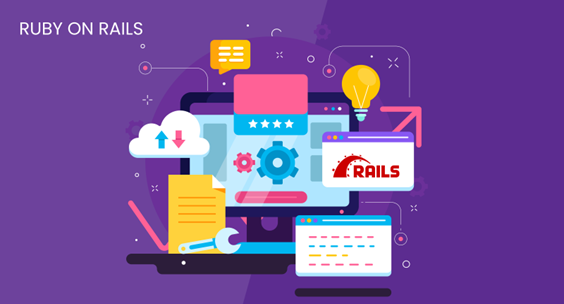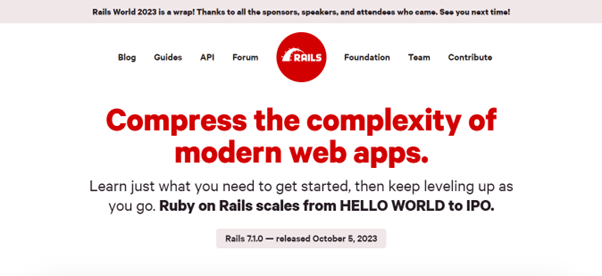Discover the fastest web development frameworks 2023 for speed! Compare and choose the top ones for your projects.
In the fast-paced world of web development, choosing the right framework can significantly impact the speed, efficiency, and success of your projects.
With 2023 just around the corner, it’s crucial to stay up-to-date with the latest technologies and tools available.
In this article, we’ll explore the fastest web development frameworks you should consider for your projects in 2023.
One such framework that stands out is Ruby on Rails, known for its exceptional speed and efficiency.
You can Hire Ruby on Rails Developers from ROR development companies for your ROR projects!
Let’s understand everything in detail!!!!
Overview
Web development is a rapidly evolving field, and developers are constantly seeking ways to streamline their processes and deliver projects faster.
Choosing the right web development framework is a critical decision, as it can significantly impact development speed, code maintainability, and overall project success. In 2023, several frameworks are competing to be the fastest and most efficient.
The Need for Speed in Web Development
In today’s digital landscape, speed is of the essence. Users expect websites and web applications to load quickly and provide a seamless experience. Slow-loading websites can lead to high bounce rates and dissatisfied users.
Therefore, developers are on a perpetual quest to find the fastest web development frameworks that can help them meet these demands.
Top 16 Criteria for Choosing the Fastest Web Development Frameworks
Choosing the fastest web development framework is crucial for creating responsive and efficient web applications.
Several factors should be considered when evaluating the speed and performance of a web development framework.
Here are some key criteria to help you make an informed decision:
1. Load Times
The framework should minimize load times for both initial page loading and subsequent requests. Look for frameworks that offer efficient code splitting and lazy loading to minimize the initial payload.
2. Caching Mechanisms
A good framework should support various caching mechanisms, such as server-side caching, client-side caching, and content delivery network (CDN) integration. Effective caching can significantly improve the speed of your web application.
3. Concurrency and Parallelism
Modern web applications often need to handle multiple requests simultaneously. A framework that supports concurrency and parallelism can ensure that your application can handle a high volume of concurrent users without slowing down.
4. Database Access
Fast database access is crucial for web applications. Choose a framework that offers efficient database query builders or Object-Relational Mapping (ORM) tools to optimize database interactions.
5. Routing and Middleware
The framework’s routing and middleware capabilities should be fast and flexible. Efficient routing ensures that HTTP requests are processed quickly and that middleware doesn’t introduce unnecessary overhead.
6. Caching and Session Management
The framework should provide efficient mechanisms for managing user sessions and caching data. Effective session management can reduce the need for repeated database queries, improving performance.
7. Template Rendering
If your application uses server-side rendering (SSR) or template rendering, ensure that the framework’s rendering engine is optimized for speed. Look for features like template caching and pre-rendering.
8. Compression and Minification
The framework should offer built-in support for compressing and minifying assets like JavaScript and CSS. Smaller file sizes lead to faster load times.
9. Community and Documentation
A thriving community and comprehensive documentation can be invaluable when optimizing and troubleshooting performance issues. Active communities often contribute performance-enhancing plugins and tools.
10. Testing and Profiling Tools
Choose a framework that supports testing and profiling to help identify and address performance bottlenecks. Tools like Chrome DevTools, Lighthouse, and various profiling libraries can be beneficial.
11. Scalability
A framework’s scalability is essential for handling increased traffic and growing user bases. Consider whether the framework can easily scale horizontally or vertically to accommodate your application’s needs.
12. Third-Party Integrations
If your application relies on third-party services or APIs, ensure that the framework allows for efficient integration with these external resources. Slow third-party requests can impact your application’s overall performance.
13. Security
While not directly related to speed, security is paramount for web applications. A secure framework can help prevent performance-degrading security breaches and attacks.
14. Browser Compatibility
The framework should provide good cross-browser compatibility to ensure consistent performance across different web browsers.
15. Updates and Maintenance
Choose a framework that is actively maintained and updated. Frequent updates can include performance enhancements and bug fixes.
16. Community Feedback
Research reviews, performance benchmarks, and case studies from developers who have used the framework for similar projects to gauge real-world performance.
Keep in mind that the “fastest” framework can vary depending on your specific project requirements and the trade-offs you are willing to make.
It’s essential to conduct performance testing and profiling on your application to determine how well the chosen framework meets your needs.
Additionally, consider the long-term maintenance and scalability aspects when making your decision.
Let’s explore in detail about the best 4 fastest web development frameworks available in 2023.
Ruby on Rails: A Speed Champion
Ruby on Rails, often referred to as Rails, has been a standout performer in the world of web development for years.
Known for its elegant and efficient code, Rails excels in rapid development and follows the DRY (Don’t Repeat Yourself) principle.
Its Convention over Configuration (CoC) philosophy simplified coding tasks, reducing the time required for development.
If you are working on Ruby on Rails web development and looking for any experienced Ruby on Rails Development Company, then we highly recommend RORBits as your first choice for Ruby on Rails development.
Angular: Empowering Dynamic Web Apps
Angular, developed and maintained by Google, is a powerful front-end framework for building dynamic web applications.
It provides a robust structure for developing single-page applications (SPAs) and ensures speedy rendering and user interactions.
Angular’s dependency injection system enhances code reusability and maintainability.
Express.js: Speeding Up Node.js Development
Express.js is a minimal and flexible Node.js web application framework that focuses on simplifying back-end development.
Its lightweight nature and minimalist approach make it an excellent choice for building RESTful APIs and microservices.
With Express.js, developers can create high-performance server-side applications quickly.
Django: Python-Powered Speed
Django, a Python-based web framework, has gained popularity for its simplicity and speed in web application development.
It offers an array of built-in features, including an ORM (Object-Relational Mapping) system and an admin panel, which accelerates project development.
Django’s “batteries included” philosophy allows developers to build feature-rich web applications efficiently.
Final Words
In 2023, the demand for fast and efficient web development frameworks is higher than ever. Developers are constantly seeking ways to deliver high-performance websites and applications.
Ruby on Rails, Angular, Express.js, and Django are just a few of the top contenders, each excelling in its own right. The choice of framework ultimately depends on the specific requirements of your project and your team’s expertise.
If you’re looking to stay ahead in the world of web development, consider these fastest web development frameworks for your next project.
By choosing the right framework, you can accelerate development, improve performance, and deliver exceptional user experiences.
Frequently Asked Questions (FAQs)
- Are these frameworks suitable for all types of web projects?
While these frameworks are versatile, it’s essential to match the framework to your project’s specific requirements.
- Is Ruby on Rails still relevant in 2023?
Yes, Ruby on Rails continues to be a relevant and efficient framework in 2023, especially for rapid application development. If you need any assistance regarding Ruby on Rails, then you should connect with a leading Ruby on Rails Consulting Services provider like RORBits.
- Can I use multiple frameworks within a single project?
It’s possible to use multiple frameworks in a project, but it can introduce complexity. Consider your project’s needs carefully.
- How do I choose between Express.js and Django for back-end development?
The choice between Express.js and Django depends on your familiarity with JavaScript and Python, as well as your project’s specific requirements.
- Where can I learn more about these frameworks and their documentation?
You can find comprehensive documentation and resources for each framework on their respective official websites.











Leave a Comment